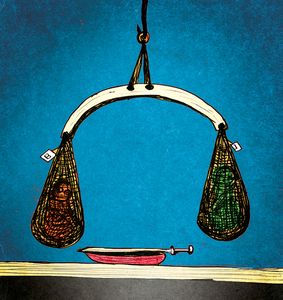Justice R.M. Lodha once called the CBI, which hadn’t got a free hand to probe the coal scam, “a caged parrot”. That was when an ‘indecisive’ Manmohan Singh was ruling India, and the government seemed as sick as a parrot.
The parrot and Bharat are said to have changed since. Today, a ‘decisive’ Narendra Modi, who had promised to restore India to the Golden Bird (Sone ki Chidiya) era of the fables, is ruling us. We are told that, under him, India is flying high like a griffon vulture. Naturally, we expect the CBI, India’s premier probe agency, to be super-sinewed like a bird of prey, swooping down on the baddies and the (Nirav) Modis.
Indeed, the CBI is full of energy, but all that is directed inward. Instead of flying out like hawks on the tail of lesser birds, the agency’s big bosses have been fighting like two blood-drawing gamecocks, pecking, jabbing and clawing at each other. Both say the other has been taking bribes to settle cases.
The saddest part was to watch the prime minister, claimed to be a man who brooks no nonsense, helplessly sit through the Punch-and-Judy show. Both men are reputed to be his picks. Special director Rakesh Asthana belongs to the Gujarat cadre. Modi had got him to probe the Godhra train incident, and the Ahmedabad bomb blasts of 2008. Director Alok Verma was brought in as the CBI boss at the last minute by shunting out R.K. Dutta, an outstanding officer who was eyeing the job.
In the end, Modi did the right thing—he clipped the wings of both, and brought in a third man, M. Nageshwar Rao, to run the agency. But by then, the two had washed a lot of dirty linen in public.
It seems there is something in the CBI office that turns its bosses into Angry Birds at times. Almost every other CBI director has had a brawl, or at least a tug of war, with his number-two. Mohan Katre had a tussle with additional director Radhakrishnan Nair, who had found a case against Reliance boss Dhirubhai Ambani and wanted to prosecute him. Later, it was found that Katre’s son had business links with the Ambanis. S.K. Dutta fought it out with K. Madhavan over the Bofors case and the securities scam, till Madhavan quit in disgust. Joginder Singh, now more famous as a writer of motivational books than as a super sleuth, fought with joint director U.N. Biswas, who was probing the fodder scam. Biswas once became the butt of jokes when he asked the Army to help him arrest Lalu Prasad. Ranjit Sinha’s case is the funniest. He has become an accused in the coal scam, which he was probing.
The agency’s track record is a bit paradoxical. It was set up to probe corruption cases, but its record has been dismal on that front. Cases have been pursued and dropped, revived and shelved, depending on political equations. Ask Mayawati or Mulayam Singh, the DMK or the AIADMK. Probing murder cases does not fall within its normal charter of duties, except when state governments request it to. But, whenever the CBI has probed such cases, it has come out with the culprit in handcuffs, and mostly got convictions.
Courts have tried to streamline the agency’s running and free it from political control. The Gauhati High Court even found the agency an illegal entity! In the Vineet Narain case, the Supreme Court asked the Central Vigilance Commission to supervise the agency’s running. The Lokpal Act sought to dilute the executive’s say in the appointment of the CBI chief. In individual cases, like the Jain hawala, the court tried to monitor the probe.
But such cures have been found to be worse than the maladies. Why? Simple! They fly against the principle of separation of powers.
prasannan@theweek.in


